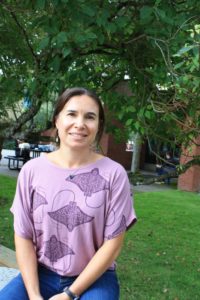When we are sitting down to a wholesome supper, do we ever wonder where it comes from? Do we ask ourselves what methods are used to provide our plate of spaghetti, and what each ingredient might go through, or where it might come from? When we think, “I feel like Italian tonight,” do we wonder about the culture that supports our whims and cravings?
Camosun Anthropology instructor Nicole Kilburn does wonder about what went on beyond the kitchen, and she investigated further and wrote a book—The Future Has an Ancient Heart: Southern Italian Food Traditions in a Modern World—about her findings.
“Food anthropology was something that I was interested in, so I started offering my food anthropology class here in 2012. I was looking around for opportunities for professional development, and I stumbled across this opportunity to participate in the culinary workshop in Italy,” says Kilburn. “This workshop was all about learning about food and culture and how food connects people to landscape and culture. It was perfect. I think about food as this lens to view the world, so this was this opportunity to think about this in one particular place.”

It was in her workshop that Kilburn got the idea for a book.
“I didn’t plan on writing a book,” she admits. “I was bringing all the content into my classes, actually, but I had so much material going stale on my office shelves, so I started compiling it, which was really fun, and then I finally got to write it.”
Kilburn wrote the book with the help of Tonio Creanza, a sixth-generation olive farmer who had facilitated the workshop. Kilburn wanted her book to teach people about some of the truths of globalization, and about how tourism might actually be of help.
“It’s really difficult for people to keep up with the intergenerational traditions, particularly in terms of food,” she says. “We’ve got globalization, which means people will go to one grocery store and do a one-stop shop, instead of buying bread every morning from the baker, or chatting with Mimi the butcher, who has a long-term relationship with the farmers and with the people who live in his neighbourhood. There is just all of this… decay. That was really interesting to think about, whether or not tourism can bring new dignity and value to these food producers.”
Kilburn says that it’s important to have awareness of where our food comes from, and to know how much work is behind the groceries that we buy. She hopes that her book will provide some further insight into all this.
“If you’re interested in food, if you’re interested in Italy and history, then you are going to find lots of things that are of interest, and it should create more awareness,” she says. “Awareness over why are we not paying our food producers what they are worth. People are fine with paying a plumber $125 an hour to fix our toilet, but we complain about the price of fruit going up at a farmer’s market? Why are we expecting that their expertise and hard work not be fairly compensated? So I believe that re-establishing that interest and awareness in food, and where it really comes from, will make us think about how to get more connected.”
Kilburn believes that becoming more connected and aware is actually very simple.
“Go to a farmer’s market and start asking questions,” she says. “It is intoxicating to talk to these food producers; they are so passionate about what they do. It is something that they live and breathe, and they are so proud to be able to bring it you.”
